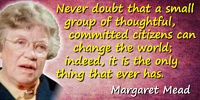 (source)
(source)
|
Margaret Mead
(16 Dec 1901 - 15 Nov 1978)
American anthropologist who is best known for her studies of the indigenous people of Oceania, and her book, Coming of Age in Samoa.
|
Science Quotes by Margaret Mead (39 quotes)

(1977) From b/w photo by Lynn Gilbert(CC BY-SA 4.0) Credit palette.fm for colorization assistance (source)
[American] Fathers are spending too much time taking care of babies. No other civilization ever let responsible and important men spend their time in this way. They should not be involved in household details. They should take the children on trips, explore with them and talk things over. Men today have lost something by turning towards the home instead of going out of it.
— Margaret Mead
As quoted in interview with Frances Glennon, 'Student and Teacher of Human Ways', Life (14 Sep 1959), 147.
[American] Motherhood is like being a crack tennis player or ballet dancer—it lasts just so long, then it’s over. We’ve made an abortive effort to turn women into people. We’ve sent them to school and put them in slacks. But we’ve focused on wifehood and reproductivity with no clue about what to do with mother after the children have left home. We’ve found no way of using the resources of women in the 25 years of post-menopausal zest. As a result many women seem to feel they should live on the recognition and care of society.
— Margaret Mead
As quoted in interview with Frances Glennon, 'Student and Teacher of Human Ways', Life (14 Sep 1959), 147.
[Dubious attribution] I was wise enough never to grow up, while fooling most people into believing that I had.
— Margaret Mead
Although seen widely circulated on the web, Webmaster has so far been unable to verify any primary source. Found in few books, but without any citation, for example as early as Joel Goodman, Laffirmations: 1001 Ways to Add Humor to Your Life and Work (1995), 305.
[Dubious attribution] We are all continually faced with great opportunities which are brilliantly disguised as unsolvable problems.
— Margaret Mead
Attributed. (?) Note: So far, Webmaster has been unable to find a primary source for this quote. It can be found seen quoted in several books, but always without citation. The earliest found with attribution to Mead is in Brian E. Walsh, Unleashing Your Brilliance (2005). However, earlier books attribute differently, for example to Lee Iacocca (2000), and to John Gardner (1986). Also found without any attribution (“it has been said”), without any citation, in Christopher H. Lovelock and Charles B. Weinberg, Readings in Public and Nonprofit Marketing (1978), 152. If you know the primary source, please contact Webmaster.
[On mediocrity] What we have today is a retreat into low-level goodness. Men are all working hard building barbecues, being devoted to their wives and spending time with their children. Many of us feel, “We never had it so good!” After three wars and a depression, we’re impressed by the rising curve. All we want is it not to blow up.
— Margaret Mead
As quoted in interview with Frances Glennon, 'Student and Teacher of Human Ways', Life (14 Sep 1959), 147.
[On solving problems:] The first thing you do is scream.
— Margaret Mead
As quoted in interview with Frances Glennon, 'Student and Teacher of Human Ways', Life (14 Sep 1959), 147.
[On suburbia] We’re bringing up our children in one-class areas. When they grow up and move to a city or go abroad, they’re not accustomed to variety and they get uncertain and insecure. We should bring up our children where they’re exposed to all types of people.
— Margaret Mead
As quoted in interview with Frances Glennon, 'Student and Teacher of Human Ways', Life (14 Sep 1959), 147.
A neurotic person can be most simply described as someone who, while he was growing up, learned ways of behaving that are self-defeating in his society.
— Margaret Mead
In Margaret Mead and Rhoda Bubendey Métraux (ed.), Margaret Mead, Some Personal Views (1979), 216.
And as I had my father’s kind of mind—which was also his mother’s—I learned that the mind is not sex-typed.
— Margaret Mead
Blackberry Winter: My Earlier Years (1973), 54.
Anthropologists are highly individual and specialized people. Each of them is marked by the kind of work he or she prefers and has done, which in time becomes an aspect of that individual’s personality.
— Margaret Mead
In Margaret Mead and Rhoda Bubendey Métraux (ed.), Margaret Mead, Some Personal Views (1979), 258.
Children must be taught how to think, not what to think.
— Margaret Mead
In 'Education for Choice', Coming of Age in Samoa (1928, 1961), 246.
Extrasensory perception is a scientifically inept term. By suggesting that forms of human perception exist beyond the senses, it prejudges the question.
— Margaret Mead
In Margaret Mead and Rhoda Bubendey Métraux (ed.), Margaret Mead, Some Personal Views (1979), 220.
For the very first time the young are seeing history being made before it is censored by their elders.
— Margaret Mead
…...
Having someone wonder where you are when you don’t come home at night is a very old human need.
— Margaret Mead
As quoted, without citation, in New Woman (1983), 13, 90.
I do not think we can impose limits on research. Through hundreds of thousands of years, man’s intellectual curiosity has been essential to all the gains we have made. Although in recent times we have progressed from chance and hit-or-miss methods to consciously directed research, we still cannot know in advance what the results may be. It would be regressive and dangerous to trammel the free search for new forms of truth.
— Margaret Mead
In Margaret Mead and Rhoda Bubendey Métraux (ed.), Margaret Mead, Some Personal Views (1979), 89.
I like to find mavericks, students who don’t know what they’re looking for, who are sensitive and vulnerable and have unusual pasts. If you do enough work with these students you can often transform their level of contribution. After all, the real breakthroughs come from the mavericks.
— Margaret Mead
As quoted in interview with Frances Glennon, 'Student and Teacher of Human Ways', Life (14 Sep 1959), 143. Mead attributes her own pioneering approach to being educated at home by her grandmother, a retired schoolteacher, whom she said “was about 50 years ahead of her time—for instance, she taught me algebra before arithmetic.”
I like to handle babies. You can learn a lot from the way they respond, the way they slide down your hips, the way they trust you. The first thing a child must learn is to trust.
— Margaret Mead
As quoted in interview with Frances Glennon, 'Student and Teacher of Human Ways', Life (14 Sep 1959), 144.
I make many of my friends by lecturing. I keep the lectures informal, if I can, with lots of discussion, and I never give the same one twice—I’d die of boredom if I did.
— Margaret Mead
As quoted in interview with Frances Glennon, 'Student and Teacher of Human Ways', Life (14 Sep 1959), 143.
I must admit that I personally measure success in terms of the contributions an individual makes to her or his fellow human beings.
— Margaret Mead
In Redbook, November 1978.
I think all museums should be directed toward 12-year-old boys. They’re the brightest group you can find and this is the age when you can arouse their curiosity and interest.
— Margaret Mead
As quoted in interview with Frances Glennon, 'Student and Teacher of Human Ways', Life (14 Sep 1959), 147. [See another quote on this webpage beginning, “Junior high school…” in which Mead compares boys “in junior high school with girls who are two years ahead of them.” That suggests that the subject quote is comparing boys with boys. Unfortunately, the subject quote includes no further context from the interview. —Webmaster]
Instead of being presented with stereotypes by age, sex, color, class, or religion, children must have the opportunity to learn that within each range, some people are loathsome and some are delightful.
— Margaret Mead
…...
Instead of being presented with stereotypes by age, sex, color, class, or religion, children must have the opportunity to learn that within each range, some people are loathsome and some are delightful.
— Margaret Mead
In Twentieth Century Faith: Hope and Survival (1972), 61.
Instead of needing lots of children, we need high-quality children.
— Margaret Mead
…...
It is utterly false and cruelly arbitrary to put all the play and learning into childhood, all the work into middle age, and all the regrets into old age.
— Margaret Mead
Quoted, without citation, as a column filler, in New York State Department of Mental Hygiene, Mental Hygiene News (1949), Volumes 20-26, 20. Webmaster has so far been unable to find a primary source, so please contact if you know the primary source.
It’s easier for a woman to go into a strange village than a man. If a strange man wanders in, the natives are afraid he’ll take their wives away, but a woman can work with the mothers and children.
— Margaret Mead
Explaining her ability in observing Pacific Island cultures. As quoted in interview with Frances Glennon, 'Student and Teacher of Human Ways', Life (14 Sep 1959), 143.
Junior high school seemed like a fine idea when we invented it but it turned out to be an invention of the devil. We’re catching our boys in a net in which they’re socially unprepared. We put them in junior high school with girls who are two years ahead of them. There isn’t a thing they should have to do with girls at this age except growl at them.
— Margaret Mead
As quoted in interview with Frances Glennon, 'Student and Teacher of Human Ways', Life (14 Sep 1959), 147.
Many people are shrinking from the future and from participation in the movement toward a new, expanded reality. And, like homesick travelers abroad, they are focusing their anxieties on home. The reasons are not far to seek. We are at a turning point in human history. … We could turn our attention to the problems that going to the moon certainly will not solve … But I think this would be fatal to our future. … A society that no longer moves forward does not merely stagnate; it begins to die.
— Margaret Mead
In 'Man On the Moon' (1969) collected in Margaret Mead and Robert B. Textor (ed.), The World Ahead: An Anthropologist Anticipates the Future (2005), 248. The original magazine article was written shortly before the first Moon landing for the lay public, in Redbook (Jun 1969). It was later reprinted in the Congressional Record—Senate (30 Jun 1969), 17725-17726.
Most people prefer to carry out the kinds of experiments that allow the scientist to feel that he is in full control of the situation rather than surrendering himself to the situation, as one must in studying human beings as they actually live.
— Margaret Mead
In Blackberry Winter (1972), 321.
Never depend upon institutions or government to solve any problem. All social movements are founded by, guided by, motivated and seen through by the passion of individuals.
— Margaret Mead
As quoted, without citation, in David Suzuki and Holly Dressel , From Naked Ape to Superspecies: Humanity and the Global Eco-Crisis (1999, 2009), 347.
Never doubt that a small group of thoughtful, committed citizens can change the world; indeed, it is the only thing that ever has.
— Margaret Mead
Although this quote is frequently seen, “the quotation does not appear in any of Mead’s published work, and may have first appeared in one of her public speeches, perhaps, some say, in her speech at the first Earth Day celebration in 1970.” As stated by Nancy Lutkehaus, 'Margaret Mead: Public Anthropologist', Anthropology Now (Apr 2009), 1, No. 1, 34.
No society has ever yet been able to handle the temptations of technology, to mastery, to waste, to exuberance, to exploration and exploitation. We have to create something new, something that has never existed in the world before. We have to learn to cherish this Earth and cherish it as something that is fragile, that’s only one, that’s all we have, and we have to set up a system that is sufficiently complex to continue to monitor the whole. We have to use our scientific knowledge to correct the dangers that have come from science and technology.
— Margaret Mead
Speaking at the first Earth Day (22 Apr 1970). As quoted in Hans Baer, Merrill Singer, The Anthropology of Climate Change: An Integrated Critical (2014), 23.
Our humanity rests upon a series of learned behaviors, woven together into patterns that are infinitely fragile and never directly inherited.
— Margaret Mead
…...
Samoa culture demonstrates how much the tragic or the easy solution of the Oedipus situation depends upon the inter-relationship between parents and children, and is not created out of whole cloth by the young child’s biological impulses.
— Margaret Mead
Male and Female: A Study of the Sexes in a Changing World (1949), 119.
The negative cautions of science are never popular. If the experimentalist would not commit himself, the social philosopher, the preacher, and the pedagogue tried the harder to give a short-cut answer.
— Margaret Mead
In Coming of Age in Samoa (1928, 2001), 4.
The only way a woman can marry now is to agree to become a charwoman, regardless of her education and skills.
— Margaret Mead
…...
We are living beyond our means. As a people we have developed a life-style that is draining the earth of its priceless and irreplaceable resources without regard for the future of our children and people all around the world.
— Margaret Mead
…...
We have refused to recognize the creativity of youth. We don’t want our children to write poetry or go to the stars. We want them to go steady, get married and have four children.
— Margaret Mead
As quoted in interview with Frances Glennon, 'Student and Teacher of Human Ways', Life (14 Sep 1959), 147.
We talk about our high standard of living in this country. What we have is a high standard of work. Usually the peaks of civilization have been periods when a large proportion of the population had time to live. I don’t think we’re doing this today. I think the people who could live are still spending their time and supplementary resources on making a living.
— Margaret Mead
As quoted in interview with Frances Glennon, 'Student and Teacher of Human Ways', Life (14 Sep 1959), 147.
We won’t have a society if we destroy the environment.
— Margaret Mead
Collected in Michèle Brown and Ann O’Connor (eds.), Woman Talk: A Book of Women’s Quotes (1985), 196. No source given.
Quotes by others about Margaret Mead (1)
By a recent estimate, nearly half the bills before the U.S. Congress have a substantial science-technology component and some two-thirds of the District of Columbia Circuit Court’s case load now involves review of action by federal administrative agencies; and more and more of such cases relate to matters on the frontiers of technology.
If the layman cannot participate in decision making, he will have to turn himself over, essentially blind, to a hermetic elite. … [The fundamental question becomes] are we still capable of self-government and therefore freedom?
Margaret Mead wrote in a 1959 issue of Daedalus about scientists elevated to the status of priests. Now there is a name for this elevation, when you are in the hands of—one hopes—a benevolent elite, when you have no control over your political decisions. From the point of view of John Locke, the name for this is slavery.
If the layman cannot participate in decision making, he will have to turn himself over, essentially blind, to a hermetic elite. … [The fundamental question becomes] are we still capable of self-government and therefore freedom?
Margaret Mead wrote in a 1959 issue of Daedalus about scientists elevated to the status of priests. Now there is a name for this elevation, when you are in the hands of—one hopes—a benevolent elite, when you have no control over your political decisions. From the point of view of John Locke, the name for this is slavery.
Quoted in 'Where is Science Taking Us? Gerald Holton Maps the Possible Routes', The Chronicle of Higher Education (18 May 1981). In Francis A. Schaeffer, A Christian Manifesto (1982), 80.
See also:






 In science it often happens that scientists say, 'You know that's a really good argument; my position is mistaken,' and then they would actually change their minds and you never hear that old view from them again. They really do it. It doesn't happen as often as it should, because scientists are human and change is sometimes painful. But it happens every day. I cannot recall the last time something like that happened in politics or religion.
(1987) --
In science it often happens that scientists say, 'You know that's a really good argument; my position is mistaken,' and then they would actually change their minds and you never hear that old view from them again. They really do it. It doesn't happen as often as it should, because scientists are human and change is sometimes painful. But it happens every day. I cannot recall the last time something like that happened in politics or religion.
(1987) -- 


